
Juan Luis Guerra Seijas is a Dominican musician, singer, composer, and record producer. He has sold 15 million records worldwide, making him one of the best-selling Latin music artists. Throughout his career, he has won numerous awards including 24 Latin Grammy Awards, three Grammy Awards, and one Latin Billboard Music Award. He won 3 Latin Grammy Awards in 2010, including Album of the Year. In 2012, he won the Latin Grammy Award for Producer of the Year.

Bachata Rosa is the fifth studio album by Dominican singer-songwriter Juan Luis Guerra and his group 4.40. It was released on 11 December 1990, by Karen Records. It brought bachata music into the mainstream in the Dominican Republic and gave the genre an international audience. A Portuguese version of the record was released in 1992 under the title Romance Rosa; it was certified gold in Brazil. The album received a Grammy Award for Best Tropical Latin Album and two Lo Nuestro Awards for Tropical Album of the Year and Tropical Group of the Year.

Ojalá Que Llueva Café is the fourth studio album by Dominican singer-songwriter Juan Luis Guerra released in 1989 by Karen Records. It is considered one of his most emblematic and important albums. The album set the musical path for his later albums, re-formulating Dominican merengue and bachata music through the contemporary elements of pop, rock, salsa, or jazz. Incorporating socially conscious lyrics with danceable merengues and romantic-poetic bachatas, the album is considered one of the most important albums of his discography.
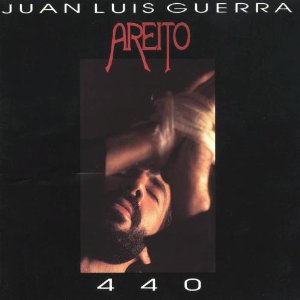
Areíto is the sixth album by Juan Luis Guerra with his band 440, released on 8 December 1992, by Karem Records. The album, meant to be a tribute to the indigenous tribes of the Dominican Republic, is named after a dance that the aboriginal inhabitants of the Greater Antilles (Taínos) accompanied with songs during their festivals and religious rites. The album contains twelve tracks including "Cuando te Beso", interpret by Santo Domingo Philharmonic Orchestra. Congolese musician Diblo Dibala played guitar on the song "El Costo de la Vida", which was a Spanish cover of his own soukous song "Kimia Eve", while the last track on the album, "Naboria daca, mayanimacaná", is sung in Arawak, the language of the Taíno people. Areíto was originally set to be released in early April 1992, but was first delayed to the end of October 1992 and was finally released on 8 December 1992.
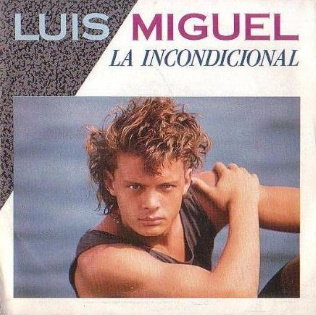
"La Incondicional" is a song written, produced, and arranged by Spanish musician Juan Carlos Calderón and performed by Mexican singer Luis Miguel. It was released in 1989 via WEA Latina as the third single from Miguel's sixth studio album, Busca una Mujer (1988). The song became his second #1 single on the Billboard Hot Latin Tracks chart after "Ahora Te Puedes Marchar" in 1987. The song broke several airplay records in Latin America, topping the charts in Mexico, Chile and Peru; and the top-ten in other countries. The success of the song helped push the album to #3 on the Billboard Latin Pop Albums with approximate sales of four million units.

Grandes Éxitos de Juan Luis Guerra y 440 or simply Grandes Éxitos is a compilation album of Dominican singer-songwriter Juan Luis Guerra, and his band 440 released in July 1995 by Karem Records. It contained Guerra's fifteen biggest hits from 1988 to 1994 on the original version and from the albums Mudanza y Acarreo(1985) to Fogarate! (1994) on the international versions. The compilation receive positive reviews by the critics.

Colección Romántica is a compilation album by Dominican songwriter and musician Juan Luis Guerra and 4.40. It was released in November 21, 2000 and February 6, 2001 in the United States by Karen Records.It is a dual album compilation including 20 of the group's classic songs remastered and re-recorded as ballads. The album also contained unaltered original versions of their softer songs, like acoustic ballads or bachatas. It would become Guerra's last album released under the Dominican independent music label Karen Records, as his later albums would be released under Vene Music and subsequently under EMI music and Capitol Latin.
The Dominican singer, songwriter and producer Juan Luis Guerra has released 14 studio albums, two live albums and forty-eight singles. He is one of the best selling Latin artist of all time with more 30 millions of records worldwide. He made his debut with his first studio album Soplando, released in 1984. He later released his second studio album in 1985, Mundanza y Acarreo which was his first national success and marked his first entry at the US Billboard Charts at number seventeen on Billboard Tropical Charts. In 1987, his third studio album Mientras Más Lo Pienso...Tú become his first work to gain international attention in countries such as Venezuela and Puerto Rico. Between this last two albums, it sold over two million copies worldwide.
Rafy Mercenario is a Puerto Rican reggaeton producer. He has produced hits for several artists including R.K.M & Ken-Y, Daddy Yankee, Don Omar and Ivy Queen.

"Como Abeja Al Panal" is a song by Dominican Republic singer-songwriter Juan Luis Guerra released in 1990 and served as the lead single from his fifth studio album Bachata Rosa (1990). It is a song that tells the story of a forbidden love.
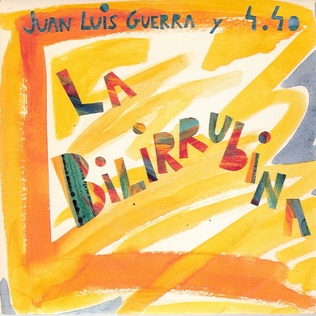
"La Bilirrubina" is a song by Dominican singer-songwriter Juan Luis Guerra. It was written by Guerra and released by Karem Records on 1990 and 1991 in Europe as the second single from his fifth studio album, Bachata Rosa. It was nominated for Record of the Year at 1991 Lo Nuestro Awards. The merengue track is considered one of Guerra's signature songs and most popular. It receive positive reviews and was listed one of the best tracks of the album.
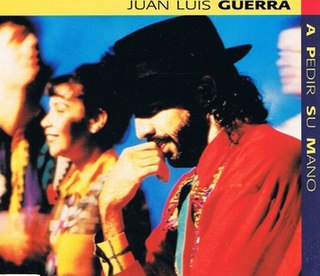
A Pedir Su Mano is a song by Dominican Republic singer-songwriter Juan Luis Guerra released as the fourth single for his album Bachata Rosa (1990). It was released in 1990 by Karem Records and in 1992 on Europe by Ariola. The track is a merengue version of the song “Dede Priscilla,” by Lea Lignazi from the Central African Republic. The track combined music elements of Afropop and zouk with merengue. The music video shows people in traditional African dress dancing in sugarcane fields with a cartoon of a red train traversing the landscape.
Estrellitas y Duendes is a song by Dominican Republic singer-songwriter Juan Luis Guerra released as the fifth single for his album Bachata Rosa (1990). It was released in 1991 by Karem Records. The track is a Bachata with elements of Bolero. It reached the top-ten on the US Billboard Hot Latin Songs and his native Dominican Republic. A live version of the track was later included on Coleccion Romantica (2001).

"Bachata Rosa" is a song by Dominican Republic singer-songwriter Juan Luis Guerra released in 1991 and served as the lead seventh and final from his fifth studio album Bachata Rosa (1990). Along with Estrellitas y Duendes and Como Abeja Al Panal, is one of Guerra's first international hits and helped to contribute to the bachata sophistication and have recognition in Latin America and Europe. The track was a commercial success, toping the airplay charts in Mexico and was the fourth single of the album to peak insade of the top 10 at the US Hot Latin Tracks.
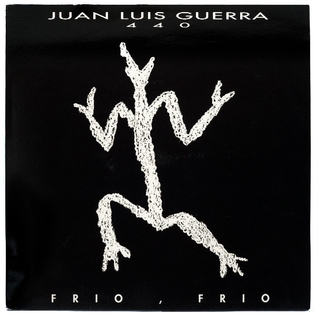
Frio Frio or Frio, Frio is the lead single of the sixth studio album Areito by Dominican superstar Juan Luis Guerra. The song is considered to be a bachata by many, however it is actually a bolero. It was written based on a poem by Federico García Lorca and was released in August 1991. The track received positive reviews from critics and was nominated for Tropical Salsa Song of the Year at the 4th Lo Nuestro Awards. Frio Frio was a success peaking at number 4 on Billboard Hot Latin Tracks and at the Top 5 airplay in Panama and Uruguay.

Señales de Humo is the second single of Juan Luis Guerra sixth studio album Areito (1992). The track is divided in two parts: The first part is a bachata and the second one the rhythm transformed to Mambo with elements of son and salsa. The title made reference of the communication that the indigenous use between vast and unpopulated areas and that are made by bonfires. The song met with critical acclaim and won Song of The Year at the 1994`s BMI Latin Awards. The track was a great success in Latin America and Billboard US Latin charts. The track was included on Guerra`s compilation album Colección Romantica (2001).
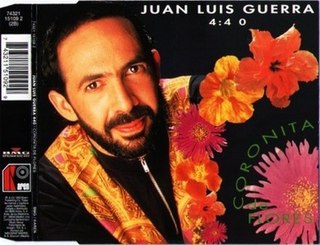
Coronita de Flores is the fifth single of Juan Luis Guerra sixth studio album Areito, released in 1993 by Karem Records. The song was written band produced by Juan Luis Guerra. The track received positive reviews due the musical structure of cha-cha and Bolero and was nominated for Tropical/Salsa Song of the Year at the 1994's Lo Nuestro Awards.

"Mal de Amor" (Lovesickness) is the fourth single from Juan Luis Guerra's sixth studio album Areíto, released in 1993 by Karem Records. The melody is by Nemous Jean Baptiste and Webert Sicot the Haitians compositors in 1960 the song was written and produced by Guerra. The track encompasses traditional merengue with Cumbia. The song was the fourth consecutive single from the album to reach the top-ten on the Billboard Hot Latin Songs chart in the United States. It also reached the top-ten in Venezuela.
Cuando Te Beso(English: When I kiss you) is the seventh and final single of Juan Luis Guerra sixth studio album Areito, released on 1993 in Europe and in January 1994 in the United States by Karem Records. The album also contained other version of the track performed by the Santo Domingo Philharmonic Orchestra. The song peaked at number 28 on the US Hot Latin Songs and reached the top-ten in Chile and Panama. The track receive positive reviews by the critics. Ramiro Burr from Austin American Statesman stated that track is "an affecting tale of devotion". Robert Hilburn from Los Angeles Times wrote that the track had percussion "had some wonderfully affecting ballad work".
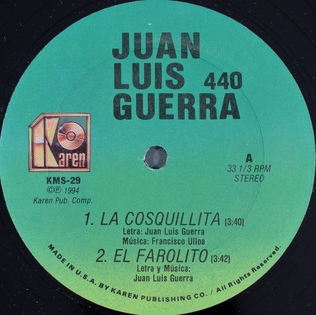
La Cosquillita is the lead single of the seventh studio album Fogarate! by dominican superstar Juan Luis Guerra. It was released on June 21, 1994 by Karen Records. The rural merengue track was written and produced with the Dominican accordionist Francisco Ulloa and his band. About the success of the track, Guerra stated "With the `perico ripiao' we are doing the same thing that we did with the `bachata,' breaking down the barriers that prevent it from reaching all of Dominican society, and then exporting it". The song became Guerra's first number-one hit in his native Dominican Republic; and became a top-ten hit in Spain, Venezuela and the US Hot Latin Songs chart.










